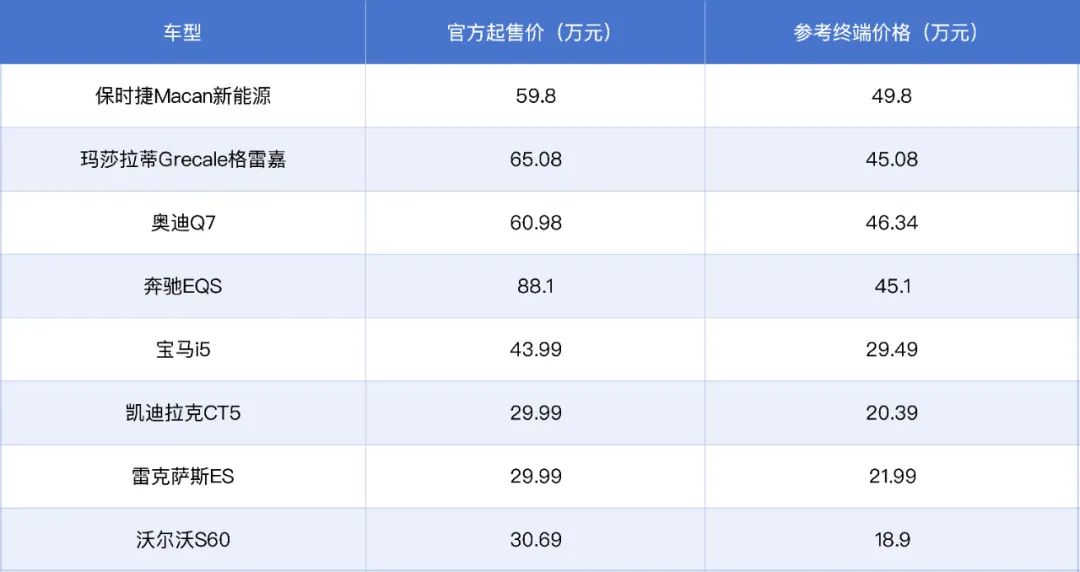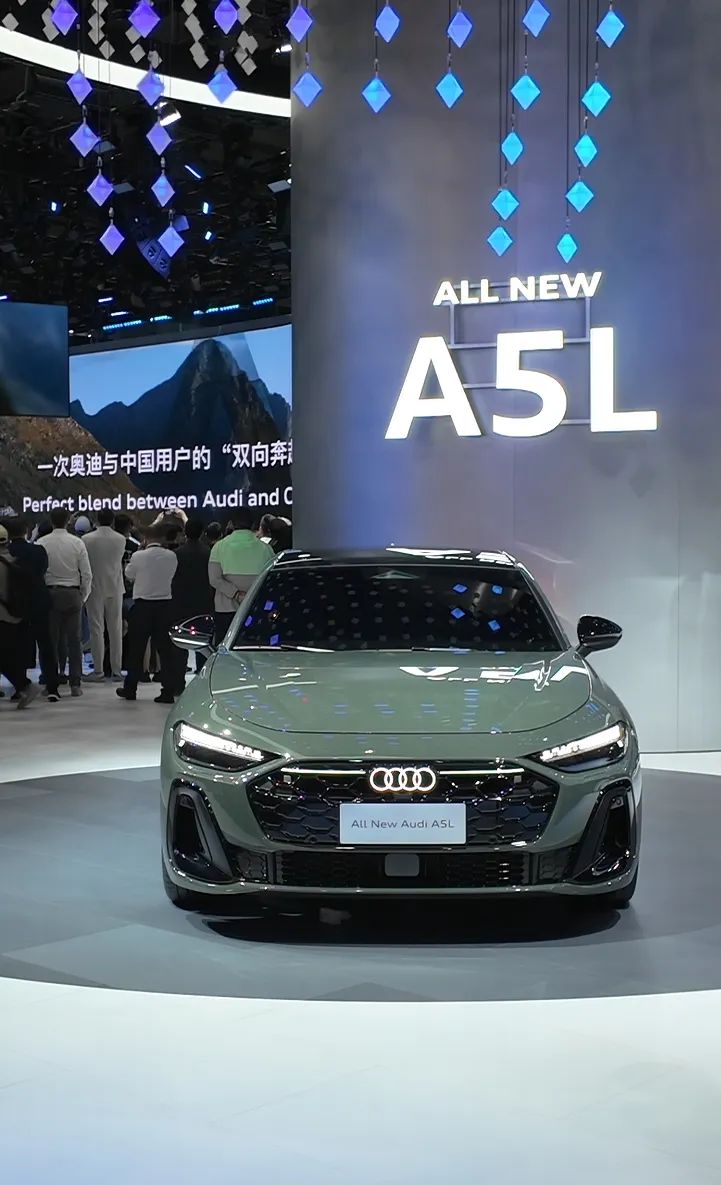When Maserati Prices Drop to 450,000 Yuan, and BMW 5 Series Starts at 300,000 Yuan...
![]() 04/15 2025
04/15 2025
![]() 466
466
Source: Yuan Auto
Porsche Macan New Energy starts at 498,000 yuan;
Maserati Grecale starts at 450,900 yuan;
Audi Q7 starts at 463,400 yuan;
BMW i5 starts at 294,900 yuan...
These prices are preliminary dealer quotes gathered online by Yuan Auto, indicating that actual transaction prices may be even lower.

With a 500,000 yuan budget for a car purchase, you can now not only achieve a certain level of "BBA freedom" (BMW, Benz, Audi) but also own a Porsche or Maserati without breaking the bank. However, the question arises: in the midst of the rise and proliferation of domestic new energy vehicles, are these struggling luxury brands still worth buying?
01
Is the only remaining advantage the car logo?
For these luxury and ultra-luxury brands whose prices have plummeted by as much as 100,000 yuan, one viewpoint is that compared to domestic new energy vehicles of the same tier, their only value lies in the brand, with their product strength lagging behind comprehensively. Entry-level models from ultra-luxury brands like the Porsche Macan New Energy and Maserati Grecale are particularly prone to such criticism.
This perspective, however, is one-sided.
Taking the Porsche Macan New Energy as an example, as a pure electric SUV boasting 360 horsepower, 564 Nm of torque, and a 0-100 km/h acceleration time of 5.7 seconds, it is not just about finding a competitor within the 500,000 yuan range; many domestic new energy vehicles priced around 200,000 yuan cannot even match it.
Moreover, the Porsche Macan New Energy has its own hidden strengths.

Beyond the acceleration and braking feel, as well as the somewhat "mystical" aspects of chassis tuning, on issues like door handles and door locks—where many popular new energy vehicles have stumbled—the Porsche Macan New Energy offers valuable lessons. To optimize the vehicle's drag coefficient and add a tech-savvy touch, many cars now feature hidden door handles on the exterior and one-touch electronic door locks inside. This, however, creates a predicament where people may not know how to open the door from both inside and outside the vehicle.
On this front, the Porsche Macan New Energy cleverly combines electronic door locks with traditional mechanical door locks. The first stage of the interior door handle triggers electric unlocking, while the second stage engages the mechanical unlocking mechanism, ensuring both daily convenience and emergency safety.
Such examples are not limited to the Porsche Macan New Energy but also extend to the aforementioned Maserati Grecale, Audi Q7, and BMW i5. Whether it's the sensory experience of exhaust sound, the safety and reliability of the all-wheel-drive system, or the precise controllability of driving range, they all reflect the distinct insights of these traditional luxury automakers towards car manufacturing.
There is no black-and-white opposition between established automakers with rich experience and rapidly rising domestic newcomers.
02
The Risk of Being Outpaced Remains
Returning to the question of whether these "heavily discounted" luxury or ultra-luxury cars, or large discount traditional brand models, are worth buying. In terms of price, it's hard to envision these cars having much more room to drop. However, if you make a purchase now, you must be prepared for the possibility of being outpaced by the iteration and upgrade of electrification and intelligence in products.
Toyota serves as a telling example in this regard.
As early as 2022, Toyota launched the bZ electric series in China, with the bZ4X, leveraging Toyota's e-TNGA architecture and Subaru's X-MODE four-wheel drive technology, as its flagship model. Despite a solid foundation, due to shortcomings in intelligence, the bZ4X, like most other traditional brand pure electric vehicles, has struggled to penetrate the market. Consequently, the price of this car quickly fell from the official starting price of 199,800 yuan to below 150,000 yuan, where it remains to this day.
For less than 140,000 yuan, you can own a medium-sized five-seat SUV with a Toyota logo, just as enticing as buying a BMW i5 for less than 300,000 yuan. However, many bZ4X owners have regretted their purchase this year.

"The price is similar, but the Boxi 3X offers intelligent assisted driving with lidar. Although the battery and chassis on ours (bZ4X) should still be better, theirs drives just as well. In contrast, we can't use trendy features like automatic parking and pilot assistance," Mr. Zhou, a bZ4X owner in Guangzhou, told Yuan Auto.
The Boxi 3X is a new pure electric vehicle launched by GAC Toyota in March this year, priced between 109,800 yuan and 159,800 yuan, with a pricing range that partially overlaps with the discounted bZ4X. With its highlights in intelligent assisted driving, the Boxi 3X has achieved market performance far surpassing that of the bZ4X, receiving over 10,000 orders upon its launch.
Don't assume that product iterations in intelligence and electrification are limited to new energy vehicles; fuel vehicles can also undergo transformative changes. For instance, the upcoming all-new generation of the Audi A4L to be launched by FAW-Volkswagen will be equipped with an intelligent assisted driving solution provided by Huawei. Against this backdrop, even though the current A4L's terminal sales price has fallen below 190,000 yuan, it's premature to conclude that the current model is more worth buying than the new one.
After all, in the current automotive market environment, there is still a high likelihood that the current A4L will receive significant discounts within half a year after the launch of its all-new generation model. By then, the car will offer both an attractive price and trendy features.

Therefore, for the current series of "heavily discounted" traditional brand models in the automotive market, whether they are worth buying can be assessed from the following aspects:
1. Upcoming Major Facelift: Since the new energy vehicle purchase subsidy policy will further decline in 2026, models that have undergone a significant facelift this year and offer sufficient discounts by the end of the year may be the least likely to be outpaced after purchase;
2. Intelligence and Electrification Relevance: In the mass market, whether it's new energy vehicles or fuel vehicles, any lack in intelligent cockpits, intelligent assisted driving, etc., will significantly affect the daily use experience of the vehicle and lead to lower vehicle value retention. For models that are obviously not keeping up with mainstream levels of intelligence and electrification, caution is advised even if they are cheap;
3. Market Availability: Making a hasty purchase of a "heavily discounted" niche model may lead to the awkward situation of dealerships withdrawing from the network or even the brand exiting the market. Therefore, no matter how attractive the price is, it is recommended to weigh the worthiness of purchasing a model based on its market availability.
In the current highly competitive automotive market, there are indeed more models with "great prices" than ever before. However, the more options there are, the more ordinary consumers should remain calm. The most worthwhile car to buy is the one that best meets our needs, rather than the one with the steepest price drop.
Some images are referenced from the internet. Please inform us if there is any infringement for deletion.








